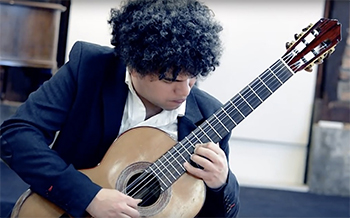by Mike Telin

On Saturday, April 27 at 7:30 pm in Plymouth Church, Perroy will make his Cleveland debut with a concert featuring works by Bach, Sor, Mertz, Villa-Lobos, and Albéniz. The concert is presented as part of the Cleveland Classical Guitar Society’s International Series. Tickets are available online.
The following is an edited transcript of our conversation:
Mike Telin: You have a wonderful program. How did you decide on these pieces?
Judicaël Perroy: It’s difficult, but normally I try to choose pieces that I would like to listen to if I were in the audience. I also try to select pieces that fit together well. That is a more mysterious process. Sometimes great pieces are fighting with the others and simply don’t fit on the program.
MT: Please give me your thoughts about each of them.
J.S. Bach’s “Prelude & Fugue” from BWV 997
JP: I am considering playing the full Suite instead of just the “Prelude and Fugue.” I have played this Suite in recital for 34 years — more than any other work.
The lute suites are part of me, and I feel like they are always new because, like with any of the masterpieces, there are an infinite number of perspectives to take. I have been listening to Beethoven’s piano sonatas for 30 years and I feel the same way about them.
Johan Kasper Mertz’s Fantaisie Hongroise
JP: It’s fun to play because it’s light and I like the czardas rhythm. The piece is linked to my youth because I used to be crazy about György Cziffra’s recording of Liszt’s Hungarian Rhapsodies. So now as a mature player it is fun to see what I can do with it.
Villa-Lobos’ Suite Populaire Bresilienne
JP: I am only playing the Valse and Mazurka. They are technically easy, so they are often performed badly by less advanced players in music school. Because of this I never considered them as concert pieces until I heard Denis Azabagic play Villa Lobos’ Prelude No. 5 — which is the same situation — and I realized that he composed some major pieces for the guitar.
Antonio José’s Sonata
JP: This is a major piece for the guitar and one of my favorites — I love its Spanish flavor combined with French impressionist influences. I have given many classes on it to some great students, and after years teaching it so much, I decided to work on it myself. I was curious to see how I would approach it after having given so much advice about it.
Albéniz’s Sevilla
JP: I’ve played it forever and I want to finish with a virtuosic piece that everyone knows.
MT: You’ve said that the decision to be a musician was linked with being a teacher. Will you please say more?
JP: Teaching is probably the most important thing to me. If I had to choose between teaching and playing I would choose teaching. For me it is more rewarding. It is easy to say now because I have super good students in San Francisco, but I was thinking the same thing 20 years ago when I had so many beginners. Since then many of my students have become teachers and/or performers. They all play very differently than I do. I don’t like to teach pieces the way that I play them, so when I listen to them, I totally forget that I was their teacher. I like this a lot because I can just enjoy the concert.
Published on ClevelandClassical.com April 23, 2019.
Click here for a printable copy of this article


